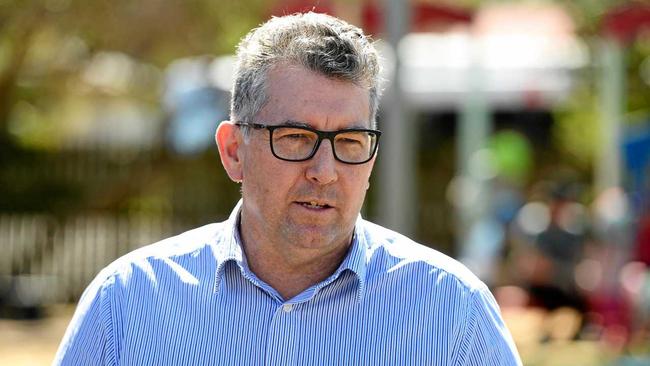Bundy aged care advocates not surprised by horror findings
BUNDABERG aged care advocate Heather Mansell-Brown is one of many locals unsurprised by the horror findings in the Aged Care Royal Commission interim report.

Bundaberg
Don't miss out on the headlines from Bundaberg. Followed categories will be added to My News.
BUNDABERG aged care advocate Heather Mansell-Brown is one of many locals unsurprised by the horror findings in yesterday's Aged Care Royal Commission interim report on neglect, released yesterday.
Mrs Mansell-Brown has been an advocate for change in aged care since she witnessed the maltreatment of her husband in his nursing home due to chronic staffing shortages.
Mrs Mansell-Brown said why she was deeply saddened by the content of the interim findings, none of it came as a surprise.
"It didn't come as a shock, it wasn't worse than what we expected, in fact, I think there is still a lot more to be done," she said.
Mrs Mansell-Brown told he NewsMail about the battles she had faced "...Reading through it I was in tears I have lived for years with this and we have fought, my God have we fought," she said.
Mrs Mansell-Brown continued stating her appreciation for the staff who care for her husband, she said you can't ignore the fact that mistakes happen because of understaffing.
"I can't fault his carers, they are beautiful people, but they are working under a lot of stress, yeah they do slip up, but you expect that because you can't expect them to do everything," she said.
Mrs Mansell-Brown currently has a petition running for better ratios in aged care facilities and while the petition has reached 322,573 signatures at the time of writing she said she had yet to have the government take notice.
Retired Enrolled Nurse Cheryl Dorron worked as a nurse for 43 years, experiencing the associated challenges first-hand.
Ms Dorron said it was extremely tough "It was demoralising, frustrating and extremely sad, I don't think there is a single nurse in aged care who goes home feeling like they were able to do absolutely everything," she said.
"Staff really missed out on one-on-one time to talk or listen to patients, despite all that you manage to build a rapport with them, but you never had the time to take the time."
Ms Dorron said a lot of issues could be linked back to 1997 when a new aged care act came into fruition.
"Nineteen-ninety seven was when the new aged care act came to be, and you can pretty much link everything back to that and what it doesn't say," she said.
"It doesn't say you have to have a registered nurse on the premises, it doesn't say the number of staff you have to have or the skill mix of the staff, so everything is up to the provider."
Ms Dorron said that there needed to be legislated ratios of staff and monitored government funding for the providers.
"I don't know any other area or industry that gets government funding and doesn't have to account for how they spend it," she said.

"You notice over a period of time the decline in registered nurses, then the medical endorsement came in for enrolled nurses to give medication and that took away the important role of the registered nurse."
"Now you have unlicensed personnel who have personal carers certificates giving out medication which is extremely dangerous, so it has been an insidious decline in the number of registered staff in aged care."
Queensland Nurses and Midwives' Union regional organiser for the Wide Bay Linda Fuller echoed the sentiments of Mrs Mansell-Brown and Ms Dorron in saying the report's findings were awful, but to be expected.
"We certainly welcome the royal commission but it's nothing surprising, just reporting what we already know," Ms Fuller said.
"I find it very hard to believe they are shocked by the findings, we have been raising these issue for many years."
The findings:
The major quality and safety issues brought to the attention of the royal commission in yesterday's findings have echoed the concerns raised by local aged care advocates and the NewsMail who has championed the need for change.
They are:
• Inadequate prevention and management of wounds, sometimes leading to septicaemia and death.
• Poor continence management - many aged care residences don't encourage
toilet use or strictly ration continence pads, often leaving distressed residents sitting or lying in urine or faeces.
• Dreadful food, nutrition and hydration, and insufficient attention to oral health, leading to widespread malnutrition, excruciating dental and other pain, and secondary conditions.
• A high incidence of assaults by staff on residents and by residents on other residents and on staff.
• Common use of physical restraint on residents, not so much for their safety or wellbeing but to make them easier to manage.
• Widespread overprescribing, often without clear consent, of drugs which sedate residents, rendering them drowsy and unresponsive to visiting family and removing their ability to interact with people.
• Patchy and fragmented palliative care for residents who are dying, creating unnecessary distress for both the dying person and their family.

MP Keith Pitt's take on the findings:
MEMBER for Hinkler Keith Pitt said the elderly should be receiving better care.
Mr Pitt said he had always been concerned about the quality of care given to the elderly.
"The Royal Commission into Aged Care Quality and Safety interim report shows that there are some providers who are falling short of delivering the high standards of care that as a community we expect for our seniors," Mr Pitt said.
"Our older Australians, who have contributed so much to our communities, deserve to be treated with dignity and respect, and should receive high-quality aged care when the need arises.
"My concern has always been the delivery of services for those in need and unfortunately there have been instances of delays in receiving those services."
Mr Pitt said he had raised the issues to the Aged Care Minister and the Coalition would act on the findings.
"I have raised these issues with both the previous Aged Care Minister Ken Wyatt and current Minister Richard Colbeck," he said.
"The Coalition Government will carefully consider and act on the findings in the interim report, while continuing to implement reform.
"We have invested more than $1 billion in aged care reforms since the Royal Commission was announced in September 2018."


